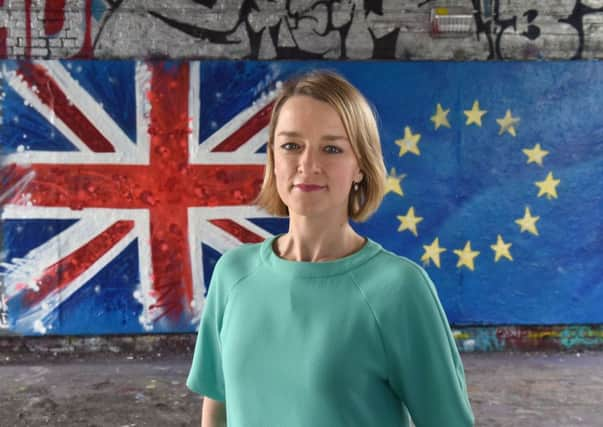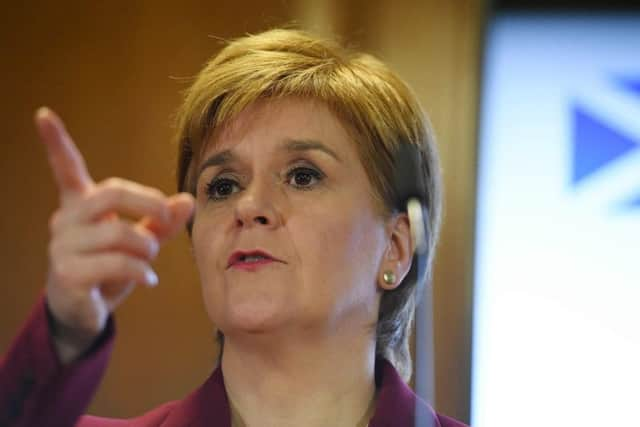Scottish independence: Val McDermid’s attack on BBC’s Laura Kuenssberg says much about movement – Brian Wilson


Through the Brexit gloom, two bright stars have emerged. Laura Kuenssberg from Westminster and Katya Adler from Brussels have been exemplary in reporting complex matters with increasing confidence to interpret events.
They have their critics, which goes with the territory. For example, I agree with Peter Oborne who called out the use of “Downing Street sources” as the basis of reporting. The same should go for all unnamed sources. However, that is a generic journalistic problem. Anonymity is not an entitlement.
Advertisement
Hide AdAdvertisement
Hide AdMs Kuenssberg is Scottish which exposes her to a different level of scrutiny and suspicion. Even then, I found the attack on her integrity by the crime writer and senior Sturgeon groupie, Val McDermid, extraordinary and irresponsible.


The journalist’s offence was to state that Ms Sturgeon had intervened “right on cue” following some Downing Street pronouncement. Anyone who claims the First Minister does not act “right on cue” to broadcast some variation of her over-arching grievance is also likely to believe that Pavlov’s dogs were free thinkers.
However, Ms McDermid was outraged on her pal’s behalf and tweeted to Ms Kuenssberg: “I used to respect you. Insulting a politician for doing their job, however, reduces that respect to shreds.” Good heavens! “Insulting a politican… shreds…”? What a sheltered life she must lead in Stockport.
Having been given the signal of respectability by such a dignitary as Ms McDermid, the civic nationalist community piled in behind her. Ms Kuenssberg – a successful Scot doing an excellent professional job – became an instant hate figure, guilty of the ultimate perfidy, “insulting” Nicola Sturgeon.
Inherent nastiness
The incident is significant not only because of its inherent nastiness but also as a symbol of what Scottish politics has been reduced to. If “insulting a politician” is grounds for denigration, what would Scotland be like if the Sturgeon/McDermid tribe ever had complete control?
The mistake of single-issue obsessives is to assume the only reason others do not share their conclusion is that they have not heard it often enough. Hammer home the same message – currently Brexit, Scotland, betrayal, independence – and the masses will succumb. That is what made one opinion poll this week particularly interesting. It was conducted for Progress Scotland, the lobbying group fronted by former SNP deputy leader, Angus Robertson, so the usual aspersions in response to inconvenient findings can hardly apply.
It found that while 12 per cent of anti-independence voters in 2014 had changed their view, a larger proportion – 25 per cent of pro-independence voters – had gone in the other direction. What made this finding unusually interesting was that it contradicted the clamour which normally surrounds us, in which the entire population is waving “yes” flags and Ian Blackford bawls about “the people of Scotland” as if we were a single entity rather than a complex one within which he represents a minority.
No poll is conclusive but it does suggest Scottish voters are drawing very different conclusions from the ones the Nationalists demand. They see a referendum outcome which has led to years of division and distraction. Many have no appetite for a repeat performance, on a far more perilous and divisive scale than Brexit.
NHS black hole
Advertisement
Hide AdAdvertisement
Hide AdThey also take note of other issues – like Audit Scotland’s latest damning report on the “black hole” facing the NHS and the failure to meet six out of eight key targets – in spite of the £14 billion balancing act which the Barnett Formula brings to devolved finances.
They note even the £1.4 million that can be squandered on the ludicrous Citizens Assembly – again driven by the constitutional imperative – which could fund even a few more nurses or libraries.
Most of all, they note the divisions created through this focus on constitutional issues which do not create a single job, benefit a single community or mollify a solitary online fanatic. And, sure, some say: “Let’s have years more of this.”
More quietly, many others conclude: “Get a life and move on – we’re not really interested.” These are voices that should be listened to for the alternative is to condemn Scotland to permanent division and the self-righteousness Ms McDermid so ably illustrated.
